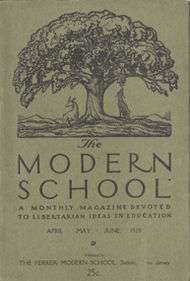Modern School (United States)

The Modern Schools, also called Ferrer Schools, were schools in the United States, established in the early Twentieth Century, that were modeled after the Escuela Moderna of Francesc Ferrer i Guàrdia, the Spanish educator and anarchist. They were an important part of the anarchist, free schooling, socialist, and labor movements in the U.S., intended to educate the working-classes from a secular, class-conscious perspective. The Modern Schools imparted day-time academic classes for children, and night-time continuing-education lectures for adults.
The New York City Modern School
The first, and most notable, of the American Modern Schools was founded in New York City, in 1911, two years after Francesc Ferrer i Guàrdia’s execution for sedition in monarchist Spain on 18 October 1909. Commonly called the Ferrer Center, it was founded by notable anarchists — including Leonard Abbott, Alexander Berkman, Voltairine de Cleyre, and Emma Goldman — first meeting on St. Mark's Place, in Manhattan’s Lower East Side, but twice moved elsewhere, first within lower Manhattan, then to Harlem. The Ferrer Center opened with only nine students, one being the son of Margaret Sanger, the contraceptives-rights activist. Man Ray, too, was a student.
Starting in 1912, the school’s principal was the philosopher Will Durant, who also taught there. Besides Berkman and Goldman, the Ferrer Center faculty included the Ashcan School painters Robert Henri and George Bellows, and its guest lecturers included writers and political activists such as Margaret Sanger, Jack London, and Upton Sinclair.[1] Student Magda Schoenwetter, recalled that the school used Montessori methods and equipment, and emphasised academic freedom rather than fixed subjects, such as spelling and arithmetic.[2]

In July 1914, radical anarchists who frequented the Ferrer Center, and loosely associated with its adult education program, plotted to bomb the mansion of tycoon industrialist John D. Rockefeller. On failing to enter the Rockefeller estate, they took the bomb back to the Lexington Avenue apartment of Louise Berger (a school habitué and an editor of the Mother Earth Bulletin), where it exploded, killing four people, including three of the bombers, and wounding many others, and brought political notoriety upon the Ferrer Center.[3]
Other Modern Schools
After the 4 July 1914 Lexington Avenue bombing, the police investigated and several times raided the Ferrer Center and other labor and anarchist organisations in New York City.[3] Acknowledging the urban danger to their school, the organizers bought 68 acres (275,000 m²) in Piscataway Township, New Jersey, and moved there in 1914, becoming the center of the Stelton Colony. Moreover, beyond New York City, the Ferrer Colony and Modern School was founded (ca. 1910–1915) as a Modern School-based community, that endured some forty years.
In 1933, James and Nellie Dick, who earlier had been principals of the Stelton Modern School, founded the Modern School in Lakewood, New Jersey,[3] which survived the original Modern School, the Ferrer Center, becoming the final surviving such school, lasting until 1958.[4]
The Modern School magazine
The Modern School magazine originally began as a newsletter for parents, when the school was in New York City, printed with the manual printing press used in teaching printing as a profession. After moving to the Stelton Colony, New Jersey, the magazine’s content expanded to poetry, prose, art, and libertarian education articles; the cover emblem and interior graphics were designed by Rockwell Kent. Artists and writers, among them Hart Crane and Wallace Stevens, praised The Modern School as “the most beautifully printed magazine in existence.”
See also
- Ferrer Colony and Ferrer Modern School in Piscataway, New Jersey
- Anarchism and education
- Christian Socialism in Utah
References
- ↑ Avrich, Paul, The Modern School Movement, AK Press (2005), p.212: At the Ferrer Center, Berkman was called “The Pope”, Goldman was called “The Red Queen”.
- ↑ Avrich, Paul, Anarchist Voices: An Oral History of Anarchism in America, “Interview with Magda Schoenwetter”, AK Press (2005), ISBN 1-904859-27-5, ISBN 978-1-904859-27-7, p.230: “What everybody is yowling about now — freedom in education — we had then, though I still can’t spell or do multiplication.”
- 1 2 3 Avrich, Paul, The Modern School Movement. Princeton: Princeton University Press (1980); Avrich, Paul, Anarchist Portraits, Princeton: Princeton University Press, ISBN 0-691-00609-1 (1988)
- ↑ AERO-GRAMME #11: The Alternative Education Resource Organization Newsletter
Further reading
- Paul Avrich, The Modern School Movement: Anarchism and Education in the United States (AK Press edition)
- Avrich, Paul, Anarchist Portraits, Princeton: Princeton University Press (1988), ISBN 0-691-00609-1
External links
- A history of the Stelton Modern School
- Ferm, Elizabeth Byrne. Freedom in Education, review here
- Modern School Collection
- The Modern School at the Anarchist Encyclopedia
- Friends of the Modern School, Piscataway NJ
- The Communal Experience (Anarchist and Mystical Communities in 20th century America, Laurence Vesey, Univ.Chicago Press, 1973, Part 1 Chapter 2 The Ferrer Colony and Modern School of Stelton.